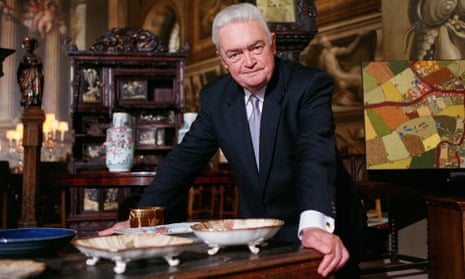The broadcaster Hugh Scully, who has died aged 72, was best known as the presenter of the Antiques Roadshow on BBC television. He was typically self-effacing in his explanation of the programme’s success in reaching up to 15 million viewers during the 19 years that he presented it, from 1981: it was the people who brought items for identification and evaluation that gave the show “colour, charm, interest, anecdote and humour. We share their triumphs and their disappointments.” Though he laid no claim to being an expert himself, Hugh was an enthusiastic collector, as was his wife, Barbara (nee Dean), whom he married in 1966.
His start with the BBC, reading radio news in Southampton in 1963, came after he wrote to the corporation claiming he had been the Paris correspondent for the International Herald Tribune. In fact, he had hawked copies of the paper on a street corner while admiring journalists drinking every evening at a cafe near the Arc de Triomphe. “That’s a good life!” he thought, and, in typically enterprising fashion, went after it for himself.
From Southampton, he moved to the BBC’s newsroom in Plymouth, where he worked with my father, David Lomax, who also went on to make a mark in national TV and was a lifelong friend. One early filming trip took Hugh to the Isles of Scilly, to interview the prime minister, Harold Wilson, for whom the islands were a favourite holiday destination. Hugh’s first scoop came in 1967 when the supertanker Torrey Canyon ran aground on rocks between Scilly and Land’s End while he was on duty. He telephoned London, persuaded them of the seriousness of the threat posed by the resulting oil slick and hired a plane to film it from the air.
The following year he became the presenter of Spotlight, the news magazine programme for the south-west. It was an opportune moment, since from 1969 such programmes were run in their various regions in the first part of a new early evening programme, Nationwide, and their presenters could contribute to the second part, presided over by Michael Barratt from London and seen over the whole network. When Barratt left the programme, Hugh succeeded him in the central role (1977-83).
On Radio 4 Hugh was the chairman of Talking About Antiques (1967-82), where he was joined by Arthur Negus, the resident furniture expert on television’s first sustained exploration of the field, Going for a Song (1965-77). Negus again joined Hugh for Collector’s World on BBC2 (1970-72) and for the initial seasons of the Antiques Roadshow.
The rise of the internet made Hugh himself a collector’s item when in 1999 the online auction company QXL.com approached him with a £3m deal to host its website and valuation service. However, QXL did not achieve the success of its competitor eBay. Hugh’s only subsequent TV series was Britain’s Finest Stately Homes (2003), for Channel 5.
Barbara had the head for business, whereas Hugh’s was full of good ideas, and in 1988 they set up their own venture, Fine Art Productions. The Falklands War (1992), a series of four one-hour programmes commissioned from Fine Arts by Channel 4, was sold round the world. It featured interviews with Admiral Sir Sandy Woodward, the Royal Navy taskforce commander, and the US politicians Alexander Haig and Caspar Weinberger, and Hugh also secured the participation of leading Argentinian figures in the conflict.
Fine Art Productions’ best-known programme was Thatcher: The Downing Street Years (1992-93) for BBC1. Of his first meeting with the woman famous for making up her mind about a man “in 10 seconds”, Hugh said: “I was expecting her to ask about my career or company or something. But no. Her first question to me was: ‘What do you know about the Franco-Prussian war?’ So I said: ‘Well, 1870-71, you could argue, was the turning point of modern European history.’ And she said: ‘Exactly! That’s when they started, they tried again in 1914. They tried again in 1939 and now they’re trying again …’” Hugh did not interrupt the ensuing tirade, and again the series sold around the world.
In these new-style documentaries, Hugh disappeared from camera and the interview questions were edited out. He was proud to have been a pioneer of this technique.
Such a degree of camouflage suited Hugh, who had not taken the conventional Oxbridge route into broadcasting. Born in Bradford on Avon, Wiltshire, to Edith (nee Smith) and her husband, also Hugh, he was brought up in Malta and Egypt, where his father was a wing commander with the RAF. After leaving Prior Park college, Bath, he worked as an assistant liaising with artists for the pianomakers and suppliers Steinway & Sons (1960-61). He developed an encyclopedic knowledge of classical music and a collection of more than 10,000 recordings, mainly of Romantic piano repertoire.
After Steinway came his time in Paris, and at the time of his death Hugh had been preparing to return to France, by moving from Cornwall to the Dordogne. A bon vivant with a great knowledge of fine wine, he respected the elegance, sense of history and relaxed pace of life of the French.
Barbara died in 2009, and Hugh is survived by two sons, Charles and Oliver, and a granddaughter.

Comments (…)
Sign in or create your Guardian account to join the discussion